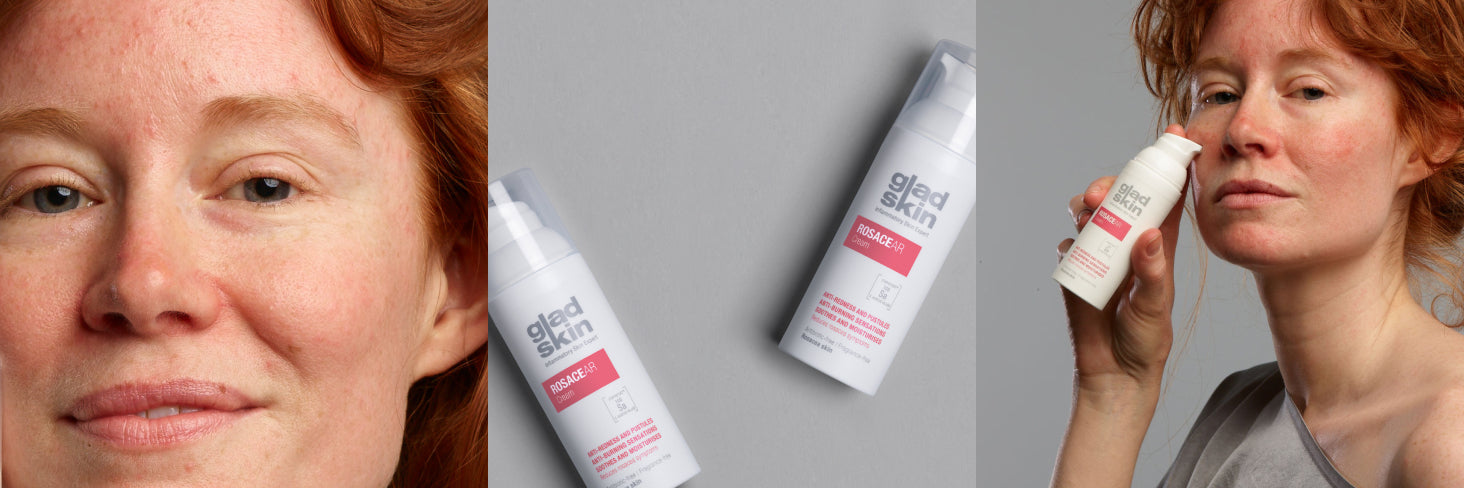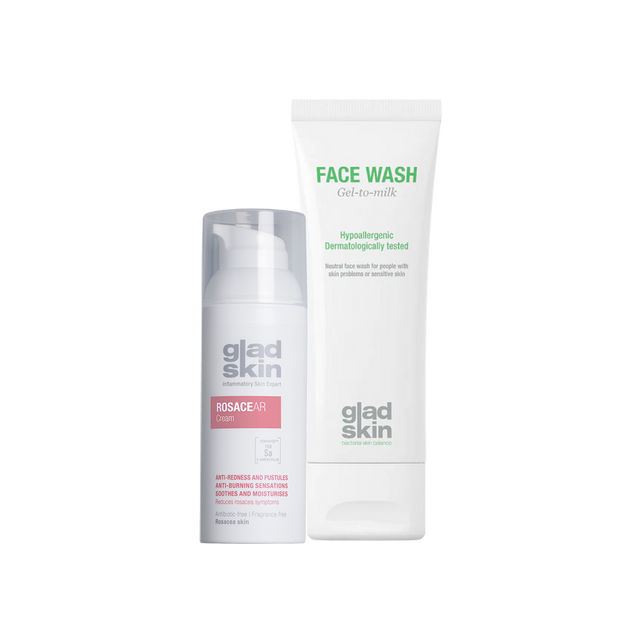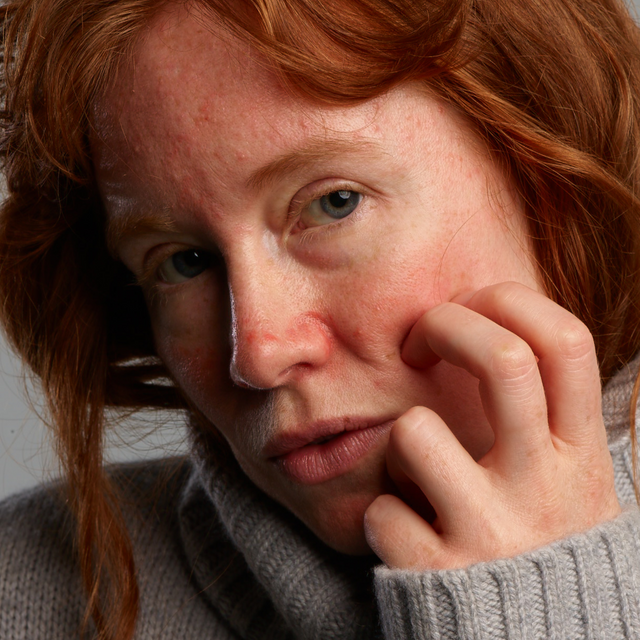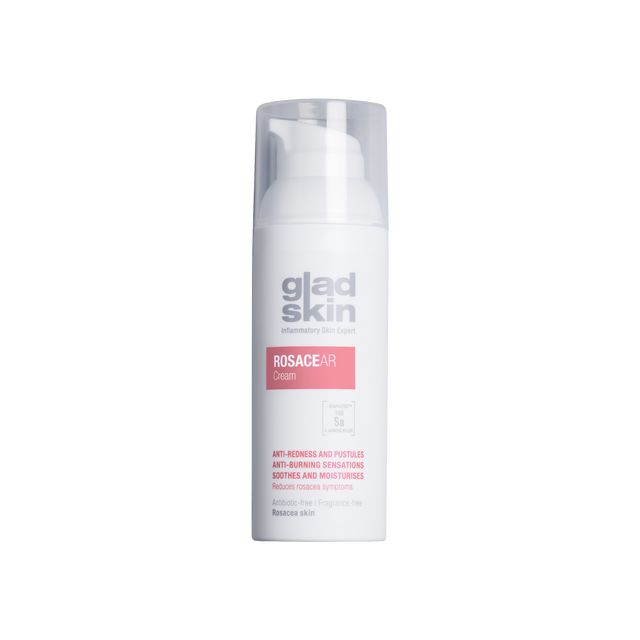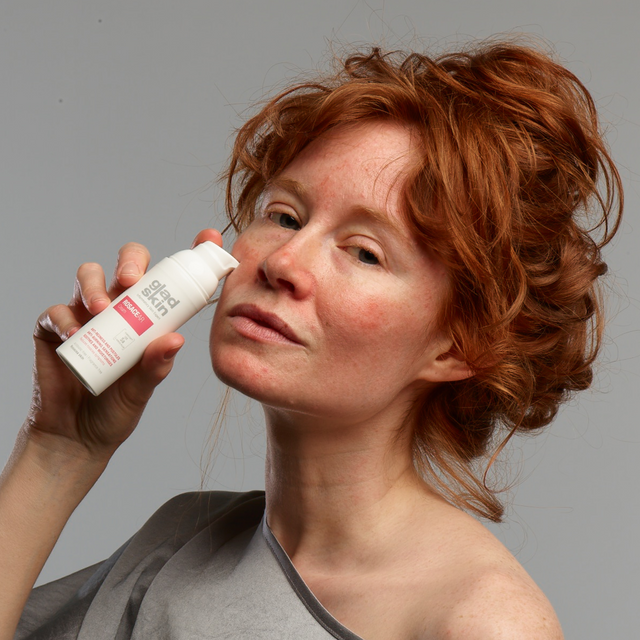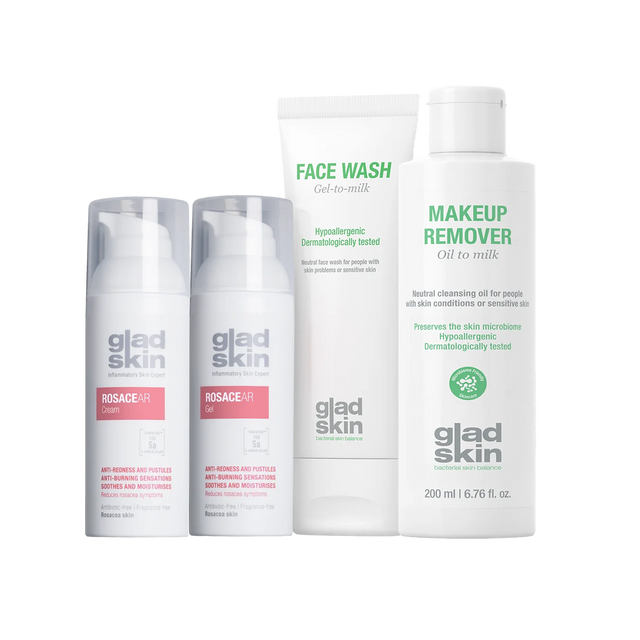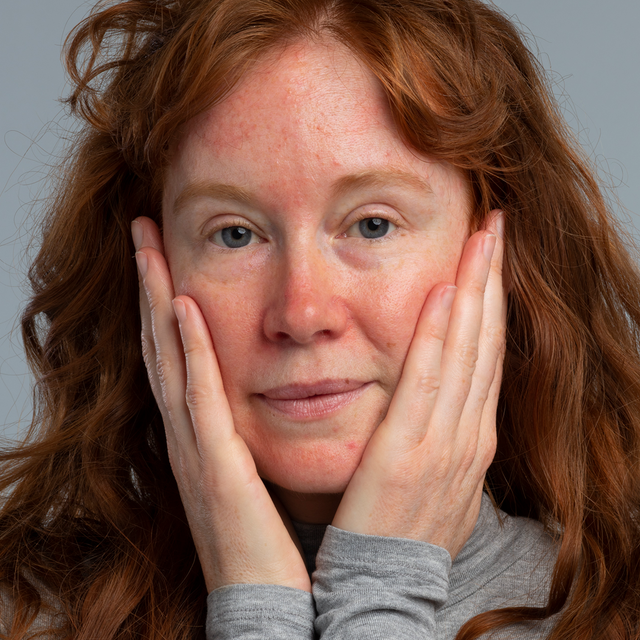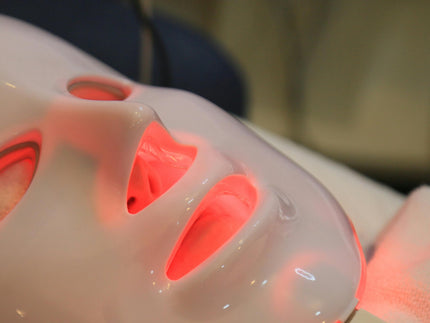The impact of different diets on the skin condition rosacea is an important topic to discuss as it can be hard for people with rosacea to identify what triggers their symptoms.
What is Rosacea?
Rosacea is a chronic inflammatory skin condition characterized by redness, flushing, and small, red bumps or pustules. It typically affects the face and can be accompanied by burning or stinging sensations. While the exact cause of rosacea is not known, it is believed to be a combination of genetic and environmental factors.
It is also believed that people with a family history of rosacea may be more likely to develop the condition. And besides that environmental triggers may include sun exposure, emotional stress, hot or cold weather, wind, spicy foods, alcohol, and certain skin care products. We will dive deeper into the effects of different types of food on your rosacea symptoms. Different types of food can have different effects on your rosacea and may trigger your rosacea to flare-up.
Foods that can have an effect on your rosacea
It is important to know what kind of foods to avoid when suffering from rosacea because certain foods can trigger flare-ups, making the condition worse. Knowing which foods to avoid can help reduce the severity of rosacea and help manage flare-ups.
Alcohol and caffeine
One of the most common dietary triggers for rosacea is alcohol consumption. Alcohol can cause the blood vessels in the face to dilate, leading to redness and flushing. You may also experience a flare-up after consuming spicy foods or drinks that are high in caffeine, as these can also cause blood vessels to dilate.
Sugar
Another dietary trigger for rosacea is a high intake of sugar and processed foods. These foods can cause inflammation in the body, which can exacerbate rosacea symptoms. A diet that is high in fresh fruits and vegetables, lean protein, and healthy fats can help to reduce inflammation and improve symptoms of rosacea.
A low-carbohydrate diet may also be beneficial if you struggle with rosacea. This is because a high intake of carbohydrates can cause a spike in blood sugar levels, which can lead to inflammation and worsen rosacea symptoms.
Hot drinks and food
One such factor is the consumption of hot drinks and foods. Consuming hot beverages and foods can cause blood vessels in the face to dilate, leading to redness and flushing. This is why it's important, when you suffer from rosacea, to avoid consuming drinks and foods that are too hot.
Histamine
Certain food and drinks that are high in histamine can also trigger your rosacea symptoms. Histamine is a chemical that occurs naturally in some foods and drinks, and it can cause inflammation and dilate blood vessels. Common histamine-rich foods include fermented foods, aged cheeses, red wine, and certain types of fish.
Lack of fatty acids
Another factor that may contribute to your rosacea flare-ups is a lack of essential fatty acids in the diet. Fatty acids, such as omega-3 and omega-6, are important for maintaining healthy skin. A diet that is low in these essential fatty acids can lead to dry, irritated skin, which can exacerbate rosacea symptoms.
Possible allergies
In conclusion, it's also worth mentioning that some people may have a sensitivity or allergy to certain foods, such as dairy products, which can also cause flare-ups.
How to reduce rosacea symptoms
Now we know what can cause your rosacea to flare-up, it is important to find out what you can do to reduce your rosacea symptoms.
Vitamins and Supplements
Certain vitamins and supplements can be beneficial when you cope with rosacea. For example, vitamin C is a powerful antioxidant that can help to reduce inflammation and improve the overall health of your skin. Vitamin E can also be beneficial, as it helps to protect the skin from damage caused by free radicals.
Stress management
Stress can worsen rosacea symptoms, so it's important to find ways to manage stress, such as through exercise, yoga, meditation, or talking to a therapist. You should find out what your stressors are and how you can avoid them.
Gentle skincare routine
Using gentle skincare products and avoiding products that are irritating can help to reduce inflammation and improve the overall health of the skin. Gladskin’s ROSACEAR collection is specifically made to soothe and reduce rosacea symptoms. It is known that many inflammatory skin diseases, such as rosacea, can be aggravated by the Staphylococcus aureus bacteria, that can cause superinfections and ignite the inflammatory response leading to redness, itch and painful pustules. We use our patented enzyme, called Staphefekt™, a so-called endolysin that is able to kill bacteria in a different way than antibiotics. It helps to break down the cell wall of the S.aureus that triggers inflammation. This enzyme only targets the Staphylococcus aureus bacteria and leaves the beneficial microbiome unharmed, which can help reduce the symptoms and improve the overall health of your skin.
Try our skincare routine adapted for your rosacea:
Step 1 - Gladskin Makeup Remover: Use our gentle oil to milk cleanser, which will lift any make-up and SPF whilst being gentle to your sensitive skin.
Step 2 - Gladskin Face Wash: Wash your face with our gel-to-milk cleanser, to make sure your skin is free from any pollution, toxins and build up sebum.
We recommend double cleansing in the evening, especially when you're wearing makeup and SPF, however in the morning using our face wash only will be enough to prep your skin for the day.
Step 3 - Gladskin ROSACEAR CREAM MD: ROSACEAR Cream with Staphefekt™ to soothe and moisturise your skin and help reduce your rosacea symptoms.
In conclusion
In summary, the impact of different diets on rosacea can be significant. While certain foods and drinks may trigger symptoms, a diet that is low in alcohol, caffeine, sugar, and processed foods, high in fresh fruits and vegetables, lean protein and healthy fats, or low in carbohydrates may be beneficial when you struggle with rosacea. It's important to work with a healthcare professional or a registered dietitian to develop a personalized plan that addresses specific dietary triggers, as well as other factors that may contribute to the development and exacerbation of rosacea symptoms.
